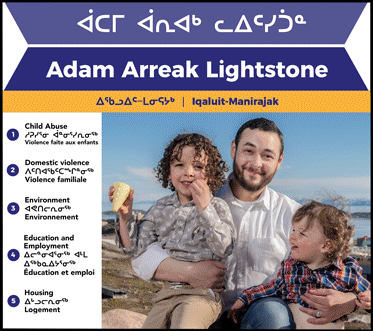New agreement between Government of Nunavut and airlines still a work in progress
“Those discussions are very, very sensitive”
The Government of Nunavut continues to negotiate a new agreement with the territory’s airlines to help support flights during the pandemic. (File photo)
Residents of Sanikiluaq who want to visit the rest of Nunavut on a commercial flight have no choice but to fly further south and then spend two weeks in isolation before continuing onto the territory.
Alan Rumbolt, MLA for Hudson Bay, wants to know when that is going to change.
“What specific options are being considered?” he asked in the legislature on Monday, Sept. 21.
David Akeeagok, Nunavut’s transportation minister, said his department has spoken with the Calm Air and Canadian North about the possibility of flights from Sanikiluaq to either Rankin Inlet or Iqaluit, but he added it’s not solely the government’s decision.
“I don’t want to really speculate or try to confirm that because we rely on the airlines for those travel routes,” he said.
The issue of airline schedules and service to Nunavut’s communities was also raised earlier in the sitting by Cathy Towtongie, MLA for Rankin Inlet North–Chesterfield Inlet.
“We recognize that in normal times the government does not run the day-to-day operations and schedules of the commercial airlines,” she said.
“With funding being made available by the Nunavut government, can we say what scheduling and service requirements have been established for smaller communities?
For the first three months of the pandemic, the Government of Nunavut did have an agreement with the two airlines, said Akeeagok.
This agreement reduced service to communities and allowed the airlines to determine where to travel while still meeting the government’s basic needs.
“Our main focus was on medical travel,” said Akeeagok.
By the end of June, the government had given the airlines $24 million in support.
The government’s original agreement with the airlines also ended in June and has yet to be replaced.
Towtongie asked how this money would help enhance service for communities like Chesterfield Inlet.
According to Akeeagok, the GN is still in discussions with the two airlines about an agreement that will cover July until December.
“Within those discussions are terms and conditions such as scheduling for communities,” he said.
Akeeagok says they haven’t seen how the federal funds will be broken down.
“Until we do and until our discussions with our two airlines are done, I really can’t say whether we’re going to impose on the times or tell them to go to certain places,” he said.
“Those discussions are very, very sensitive.”
The other issue facing Rumbolt’s constituents concerns the logistics of having only two charter flights into the community a week as opposed to six.
In a letter from Akeeagok, who is currently also the acting minister of family services, to Rumbolt sent last week, he advised that “The shortage of workers in Sanikiluaq has been impacted by the lack of flights into the community.”
Akeeagok, who is currently also the acting minister of family services, sent a letter to Rumbolt last week, acknowledging that “The shortage of workers in Sanikiluaq has been impacted by the lack of flights into the community.”
Rumbolt also sought an answer to when this might be resolved.
While Akeeagok again acknowledged the issues and lauded his department’s efforts to find workarounds, such as a 1-800 number, an immediate solution wasn’t offered.
“The underlying thing is that we do need staff to travel there and the only way we have been able to do it is through charters,” said Akeeagok.
“This is definitely an area that we need to look at.”






Gn should buy share of airline and then can tell it how to operate instead of give free cash with not even pay back
1) Neither Canadian North or Calm Air are publicly traded, so, NO, you can’t buy shares and become a shareholder.
2) Shareholders invest in publicly traded companies to make money. They do not tell the company how to operate as they obviously have confidence in the company’s business plan that they would want to invest money in the first place.
3) Investors would never tell a company they’ve invested money into, to purposely lose money so they can offer more flight conveniences that ultimately would lose the company money and hurt their investment bottomline.
Pandemic or not, businesses (private or publicly traded) are not in business to lose money.
Wrong. All companies have shares, whether publicly traded or not. Correct. People invest to make money. Governments can do this also. They own mail, electricity, roads, housing and many other companies that give essential services, why not airlines? Wrong. Majority shareholders control who is on the board and who makes company decisions. Tow the line or be fired. If government controls the board they control how it operates. Wrong. Governments can run businesses and seek to meet expenses and not make profits.
No, all companies do not have shares. What makes you think these airlines have any interest in allowing the GN to buy enough shares to be majority shareholder? What makes you think the current majority shareholders want to let this happen? There are challenges with a major customer being a major shareholder, to put it mildly.